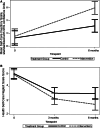Health Coaching Improves Outcomes of Informal Caregivers of Adults With Chronic Heart Failure: A Randomized Controlled Trial
- PMID: 38904103
- PMCID: PMC11244754
- DOI: 10.1161/CIRCHEARTFAILURE.123.011475
Health Coaching Improves Outcomes of Informal Caregivers of Adults With Chronic Heart Failure: A Randomized Controlled Trial
Abstract
Background: Caring for someone with heart failure takes an emotional and physical toll. Engaging in self-care may decrease stress and improve the health of informal caregivers. We conducted a randomized controlled trial testing the efficacy of a virtual health coaching intervention, compared with health information alone, on the self-care, stress, coping, and health status of heart failure caregivers.
Methods: We enrolled 250 caregivers providing care at least 8 hours/week, reporting poor self-care, and able to use technology. All received a tablet device programmed with websites providing vetted information on heart failure and caregiving. Half were randomized to also receive 10 synchronous support sessions virtually with a health coach over 6 months. Data on self-care, stress, coping, and health status were collected at baseline and 3 and 6 months. Linear mixed-effects models were used to assess the interaction between time and treatment group.
Results: The sample was majority female (85.2%), White (62.2%), spouses (59.8%), and aged 55±13.6 years. Many were employed full time (41.8%). They had been caring for the patient 8 hours/day for a median of 3.25 years. In the intention-to-treat analysis, caregivers who received the health coach intervention had statistically and clinically greater improvement across 6 months compared with the control group in the primary outcome of self-care maintenance (5.05±1.99; P=0.01) and stress (-4.50±1.00; P<0.0001). Self-care neglect declined significantly (-0.65±0.32; P=0.04), but the difference between the treatment arms disappeared when the results were adjusted for multiple comparisons. Mental health status improved statistically but not clinically (3.35±1.61; P=0.04). Active coping improved in both groups but not significantly more in the intervention group (P=0.10). Physical health status was unchanged (P=0.27).
Conclusions: This virtual health coaching intervention was effective in improving self-care and stress in heart failure caregivers.
Keywords: caregivers; coping skills; heart failure; psychological; psychosocial support systems; self-care; self-management; stress.
Conflict of interest statement
None.
Figures


Similar articles
-
Health coaching to improve self-care of informal caregivers of adults with chronic heart failure - iCare4Me: Study protocol for a randomized controlled trial.Contemp Clin Trials. 2019 Oct;85:105845. doi: 10.1016/j.cct.2019.105845. Epub 2019 Sep 6. Contemp Clin Trials. 2019. PMID: 31499227 Free PMC article.
-
Lessons learned from the implementation of a video health coaching technology intervention to improve self-care of family caregivers of adults with heart failure.Res Nurs Health. 2021 Feb;44(1):250-259. doi: 10.1002/nur.22100. Epub 2020 Dec 20. Res Nurs Health. 2021. PMID: 33341950 Free PMC article. Clinical Trial.
-
Educate, Nurture, Advise, Before Life Ends Comprehensive Heartcare for Patients and Caregivers (ENABLE CHF-PC): study protocol for a randomized controlled trial.Trials. 2018 Aug 6;19(1):422. doi: 10.1186/s13063-018-2770-9. Trials. 2018. PMID: 30081933 Free PMC article.
-
Can a complex adaptive systems perspective support the resiliency of the heart failure patient - informal caregiver dyad?Curr Opin Support Palliat Care. 2019 Mar;13(1):9-13. doi: 10.1097/SPC.0000000000000406. Curr Opin Support Palliat Care. 2019. PMID: 30507631 Review.
-
Problems experienced by informal caregivers of individuals with heart failure: An integrative review.Int J Nurs Stud. 2018 Apr;80:41-66. doi: 10.1016/j.ijnurstu.2017.12.016. Epub 2018 Jan 2. Int J Nurs Stud. 2018. PMID: 29353711 Review.
Cited by
-
Does self-care improve coping or does coping improve self-care? A structural equation modeling study.Appl Nurs Res. 2024 Aug;78:151810. doi: 10.1016/j.apnr.2024.151810. Epub 2024 Jun 13. Appl Nurs Res. 2024. PMID: 39053987 Free PMC article.
-
Development and psychometric evaluation of the self-care of informal caregivers inventory.Int J Nurs Stud Adv. 2024 Sep 12;7:100237. doi: 10.1016/j.ijnsa.2024.100237. eCollection 2024 Dec. Int J Nurs Stud Adv. 2024. PMID: 39328836 Free PMC article.
References
-
- National Association of Chronic Disease Directors. Caregiving for Family and Friends — A Public Health Issue. 2018. Accessed 16 September 2022. https://www.cdc.gov/aging/caregiving/caregiver-brief.html
-
- AARP, National Alliance for Caregiving. Caregiving in the United States 2020. 2020. Accessed March 30, 2024.
-
- Kitko L, McIlvennan CK, Bidwell JT, Dionne-Odom JN, Dunlay SM, Lewis LM, Meadows G, Sattler ELP, Schulz R, Strömberg A; American Heart Association Council on Cardiovascular and Stroke Nursing; Council on Quality of Care and Outcomes Research; Council on Clinical Cardiology; and Council on Lifestyle and Cardiometabolic Health. Family caregiving for individuals with heart failure: a scientific statement from the American Heart Association. Circulation. 2020;141:e864–e878. doi: 10.1161/CIR.0000000000000768 - PubMed
-
- Bozkurt B, Ahmad T, Alexander KM, Baker WL, Bosak K, Breathett K, Fonarow GC, Heidenreich P, Ho JE, Hsich E, et al. ; Writing Committee Members. Heart failure epidemiology and outcomes statistics: a report of the Heart Failure Society of America. J Card Fail. 2023;29:1412–1451. doi: 10.1016/j.cardfail.2023.07.006 - PMC - PubMed
Publication types
MeSH terms
Grants and funding
LinkOut - more resources
Full Text Sources
Medical

